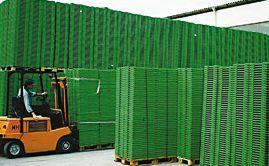
A new study, Carbon Footprint of Food Packaging, comparing the carbon footprints of Reusable Plastic Containers (RPCs) and single-use cardboard boxes, has shown that RPCs emit 60 per cent less carbon dioxide when used for packaging, shipping and storing fresh produce.
Published in February 2018, the study was conducted by Fraunhofer IBP for Stiftung Initiative Mehrweg (SIM), the Foundation for Reusable Systems, in accordance with ISO 14040/44 standards.
“This study adds to the growing body of evidence that shows RPCs outperform single use cardboard boxes when it comes to sustainability,” said Wolfgang Orgeldinger, IFCO chief executive. “For instance, the study supports information we published last year showing the use of IFCO RPCs has eliminated 3.4bn kg of CO2 emissions over the last 25 years, the equivalent of removing nearly 500,000 cars from the roads.”
The Fraunhofer study evaluated RPC and cardboard box fresh produce shipments in Germany, Spain, Italy, Netherlands and France.
The study showed that use of RPCs resulted in 60 per cent lower greenhouse gas emissions compared to single-use cardboard boxes ; RPCs emitted 15 tonnes of CO2, while cardboard boxes emitted 37 tonnes of CO2; and RPCs’ greenhouse gas emissions advantage over cardboard boxes began with the sixth use of an RPC and grew exponentially with each use thereafter.
The Fraunhofer study findings are consistent with the results of a 2017 study, Comparative Life Cycle Assessment of Reusable Plastic Containers and Display- and Non-Display-Ready Corrugated Containers Used for Fresh Produce Applications, conducted by Franklin Associates for IFCO.
That Life Cycle Assessment showed RPCs outperform single-use cardboard boxes on numerous sustainability criteria, including carbon emissions, solid waste, water use, energy use, and environmental pollution impact.
“The growing body of industry data confirms the intrinsic sustainability benefits of RPCs, providing additional incentive for forward-thinking and socially-responsible growers and retailers to partner with IFCO to improve the efficiency and sustainability of their supply chains,” concluded Orgeldinger.



